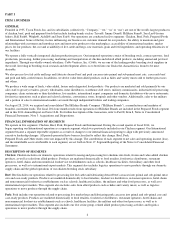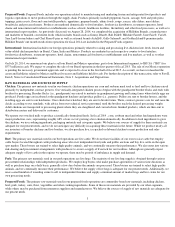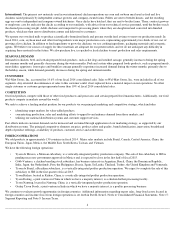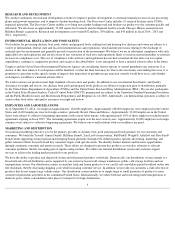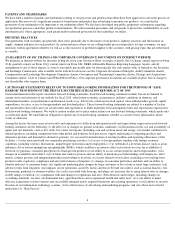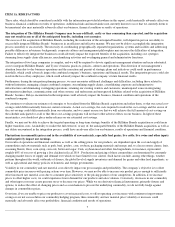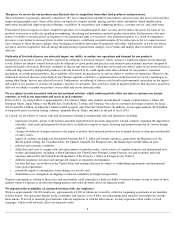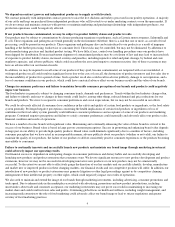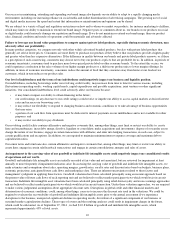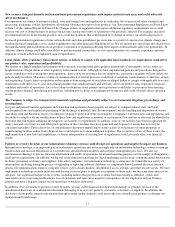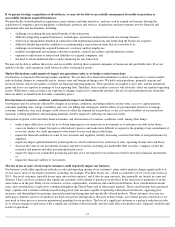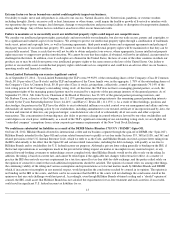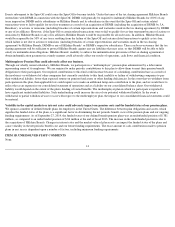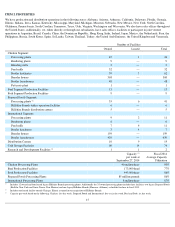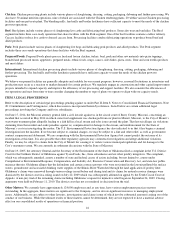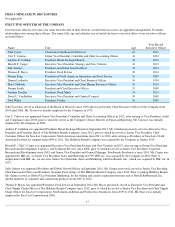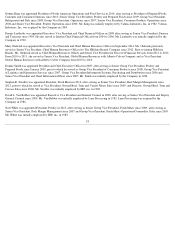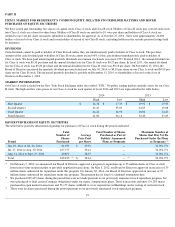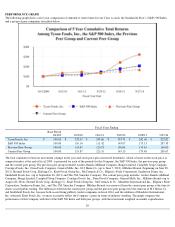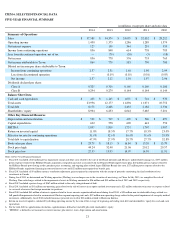Tyson Foods 2014 Annual Report Download - page 13
Download and view the complete annual report
Please find page 13 of the 2014 Tyson Foods annual report below. You can navigate through the pages in the report by either clicking on the pages listed below, or by using the keyword search tool below to find specific information within the annual report.
New or more stringent domestic and international government regulations could impose material costs on us and could adversely
affect our business.
Our operations are subject to extensive federal, state and foreign laws and regulations by authorities that oversee food safety standards and
processing, packaging, storage, distribution, advertising, labeling and export of our products. See “Environmental Regulation and Food Safety”
in Item 1 of this Annual Report on Form 10-K. Changes in laws or regulations that impose additional regulatory requirements on us could
increase our cost of doing business or restrict our actions, causing our results of operations to be adversely affected. For example, increased
governmental interest in advertising practices may result in regulations that could require us to change or restrict our advertising practices.
Increased government regulations to limit carbon dioxide and other greenhouse gas emissions as a result of concern over climate change may
result in increased compliance costs, capital expenditures and other financial obligations for us. We use natural gas, diesel fuel and electricity in
the manufacturing and distribution of our products. Legislation or regulation affecting these inputs could materially affect our profitability. In
addition, climate change could affect our ability to procure needed commodities at costs and in quantities we currently experience and may
require us to make additional unplanned capital expenditures.
Legal claims, other regulatory enforcement actions, or failure to comply with applicable legal standards or requirements could affect
our product sales, reputation and profitability.
We operate in a highly regulated environment with constantly evolving legal and regulatory frameworks. Consequently, we are subject to
heightened risk of legal claims or other regulatory enforcement actions. Although we have implemented policies and procedures designed to
ensure compliance with existing laws and regulations, there can be no assurance that our employees, contractors, or agents will not violate our
policies and procedures. Moreover, a failure to maintain effective control processes could lead to violations, unintentional or otherwise, of laws
and regulations. Legal claims or regulatory enforcement actions arising out of our failure or alleged failure to comply with applicable laws and
regulations could subject us to civil and criminal penalties that could materially and adversely affect our product sales, reputation, financial
condition and results of operations. Loss of or failure to obtain necessary permits and registrations could delay or prevent us from meeting
current product demand, introducing new products, building new facilities or acquiring new businesses and could adversely affect operating
results.
The Company is subject to stringent environmental regulation and potentially subject to environmental litigation, proceedings, and
investigations.
Our past and present business operations and ownership and operation of real property are subject to stringent federal, state, and local
environmental laws and regulations pertaining to the discharge of materials into the environment, and the handling and disposition of wastes
(including solid and hazardous wastes) or otherwise relating to protection of the environment. Compliance with these laws and regulations, and
the ability to comply with any modifications to these laws and regulations, is material to our business. New matters or sites may be identified in
the future that will require additional investigation, assessment, or expenditures. In addition, some of our facilities have been in operation for
many years and, over time, we and other prior operators of these facilities may have generated and disposed of wastes that now may be
considered hazardous. Future discovery of contamination of property underlying or in the vicinity of our present or former properties or
manufacturing facilities and/or waste disposal sites could require us to incur additional expenses. The occurrence of any of these events, the
implementation of new laws and regulations, or stricter interpretation of existing laws or regulations, could adversely affect our financial
results.
Failures or security breaches of our information technology systems could disrupt our operations and negatively impact our business.
Information technology is an important part of our business operations and we increasingly rely on information technology systems to manage
business data and increase efficiencies in our production and distribution facilities and inventory management processes. We also use
information technology to process financial information and results of operations for internal reporting purposes and to comply with regulatory,
legal and tax requirements. In addition, we depend on information technology for digital marketing and electronic communications between our
facilities, personnel, customers and suppliers. Like other companies, our information technology systems may be vulnerable to a variety of
interruptions, including during the process of upgrading or replacing software, databases or components thereof, natural disasters, terrorist
attacks, telecommunications failures, computer viruses, cyber-
attacks, hackers, unauthorized access attempts and other security issues. We have
implemented technology security initiatives and disaster recovery plans to mitigate our exposure to these risks, but these measures may not be
adequate. Any significant failure of our systems, including failures that prevent our systems from functioning as intended, could cause
transaction errors, processing inefficiencies, loss of customers and sales, have negative consequences on our employees and our business
partners and have a negative impact on our operations or business reputation.
In addition, if we are unable to prevent security breaches, we may suffer financial and reputational damage or penalties because of the
unauthorized disclosure of confidential information belonging to us or to our partners, customers, consumers or suppliers. In addition, the
disclosure of non-public sensitive information through external media channels could lead to the loss of intellectual property or damage our
reputation and brand image.
11



